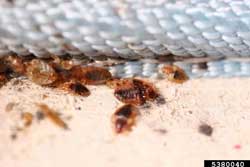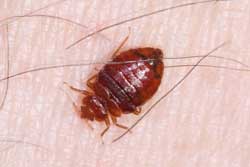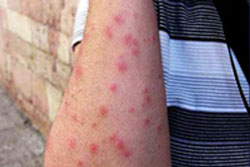Bed Bugs
Bed bugs are small wingless insects that feed solely upon the blood of warm-blooded animals. Bed bugs seek out people and animals, generally at night while these hosts are asleep, and painlessly sip a few drops of blood. While feeding, they inject a tiny amount of their saliva into the skin–some people develop a sensitivity to the saliva and additional bites may then result in mild to intense allergic responses. Bed bugs are not known to transmit any diseases to humans.
Identification
When controlling for a pest, it is important to ensure that you have the correct species in order to make informed decisions based on the biology of the species. Bedbugs are characterized by their flat oval body shape, rust coloration, and lack of wings. Immature bed bugs are about the size of a poppy seed, while adults are larger and typically the size of an apple seed. These insects are only active at night, often hiding during the day in bedframes, carpets, and bedding.
Click on images to view full-size
More Information
A Warning from the Federal Trade Commission regarding bed bug products
- Fact Sheets
- Other Publications
- Schools
- Homeowners
- Landlords and Tenants
- Travelers
- Links to More Information
Fact Sheets
- Bed Bug Fact Sheet for Renters—Maine State Housing Authority
- Bed Bugs Fact Sheet (PDF)—Maine Center for Disease Control and Prevention
- Pest Management Fact Sheet: Bed Bugs—University of Maine Cooperative Extension
- Fact Sheet: Bed Bugs (PDF)—Michigan Department of Community Health
- Fact Sheet: Bed Bugs (PDF)—University of Kentucky Cooperative Extension Service
- Integrated Pest Management In and Around the Home: Bed Bugs (PDF)—University of California
- Fact Sheet: Bed Bugs For Homeowners (PDF)—Utah State University Extension
Other Publications
- Getting the Bed Bugs Out: A Guide to Controlling Bed Bugs in Your Home (PDF)—Michigan State University Extension
- How to Get Bedbugs Out of Your Belongings (PDF)—Cornell University
- Got Bed Bugs? brochure (PDF)—Pennsylvania IPM Program
- Bed bugs are back! An IPM answer (PDF)—New York State Integrated Pest Management Program and Cornell Cooperative Extension
- Bed Bugs: Biology and Management (PDF)—Environmental Health & Safety, Harvard University
- Don't Let Bed Bugs Bite brochure (PDF)—Michigan Bed Bug Working Group
- Best Management Practices for Bed Bugs: A Summary for Consumers (PDF)—National Pest Management Association
- Preventing and Treating Bed Bugs brochure (PDF)—Arizona College of Agriculture and Life Sciences
Schools
- Bed Bugs and Schools (PDF)—Maine Center for Disease Control and Prevention and Maine Department of Education
- Guidelines for Dealing with Bed Bugs in a School Setting—University of Minnesota
- What Schools Need to Know about bed bugs (PDF)—State of Michigan
Homeowners
- Getting Bed Bugs Out Guide (PDF)—Michigan State University & Michigan Department of Public Health
- A Home Owners Guide to Bed Bugs (PDF) (originally a power point presentation) —Connecticut Agricultural Experiment Station
- Preventing and Getting Rid of Bed Bugs Safely; A Guide for Property Owners, Managers and Tenants [PDF]—Pennsylvania IPM Program
- Prevention and Control of Bed Bugs in Residences: Information for Homeowners and Tenants (PDF)—University of Minnesota Extension
Landlords and Tenants
In Maine, there are laws that protect tenants from bed bugs. The laws require that both tenants and landlords follow standards to remedy and prevent infestations from occuring. These standards are outlined in statute Title 14 §6021-A. Treatment of bedbug infestation. Landlord and tenant duties with respect to bed bug infestations.
- Preventing and Getting Rid of Bed Bugs Safely; A Guide for Property Owners, Managers and Tenants [PDF]—Pennsylvania IPM Program
- Prevention and Control of Bed Bugs in Residences: Information for Homeowners and Tenants (PDF)—University of Minnesota Extension
- What's Working for Bed Bug Control in Multifamily Housing: Reconciling best practices with research and the realities of implementation (PDF)—National Center for Healthy Housing
Travelers
- Bed Bug Tips for Travelers (PDF)—Central Ohio Bed Bug Task Force
Links to More Information
- What You've Been Told is Totally False! - Video
- Bed Bugs 101 Video— Cornell University, Inspecting for and Getting Rid of Bed Bugs
- Maine Center for Disease Control & Prevention
- National Pesticide Information Center—Provides links to many additional resources and a few videos.
- Lots of Fact Sheets and Presentations from Virginia Department of Agriculture and Consumer Services
- U.S. Environmental Protection Agency—Links to lots of information
- FAQ List for Bed Bugs—Cornell University, New York State IPM
- IdentifyUS Identification products & services
- Bed Bug Resources—Emerging Disease Issues, State of Michigan
- Let's Beat the Bed Bug—University of Minnesota
- Bed Bugs—Rutgers New Jersey Agricultural Experiment Station
[Photos, left to right: Gary Alpert, Harvard University, Bugwood.org; Whitney Cranshaw, Colorado State University, Bugwood.org; none]


